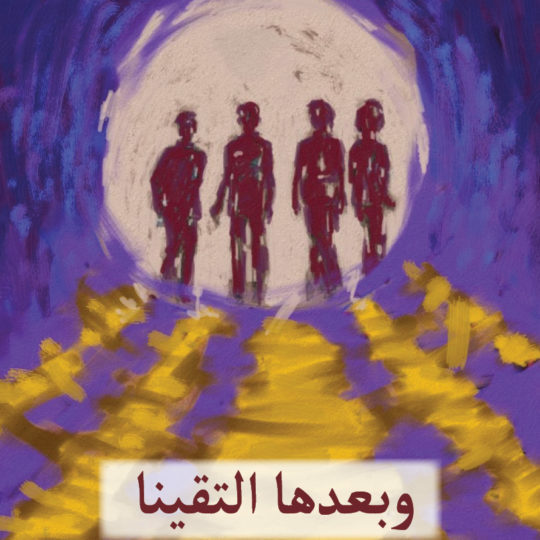 At a time when the world is facing difficult political, economic, and health challenges, Cleveland Public Theatre continues to bring people together by opening its doors to diverse local communities. An Arabic speaking group wrote stories going into topics that discuss prejudices, division, parents’ sacrifices, and the struggle of meeting our duties to ourselves, family, and society. All these issues were presented by Masrah Cleveland Al-Arabi in the play وبعدها التقينا And Then We Met. The play is developed by the Ensemble under the direction of Raymond Bobgan and Faye Hargate. Bobgan, the Executive Artistic Director of Cleveland Public Theatre, greeted the crowd in the Arabic and English languages “Ahlan wa sahlan bikom” or you are welcome. A gesture that was absolutely touching and unifying just like the moral and purpose of this play.
At a time when the world is facing difficult political, economic, and health challenges, Cleveland Public Theatre continues to bring people together by opening its doors to diverse local communities. An Arabic speaking group wrote stories going into topics that discuss prejudices, division, parents’ sacrifices, and the struggle of meeting our duties to ourselves, family, and society. All these issues were presented by Masrah Cleveland Al-Arabi in the play وبعدها التقينا And Then We Met. The play is developed by the Ensemble under the direction of Raymond Bobgan and Faye Hargate. Bobgan, the Executive Artistic Director of Cleveland Public Theatre, greeted the crowd in the Arabic and English languages “Ahlan wa sahlan bikom” or you are welcome. A gesture that was absolutely touching and unifying just like the moral and purpose of this play.
 A group of four strangers, from different backgrounds and religions ruled by political and sectarian conflicts, are forced by war to refuge to a safe place, where they meet and eventually live in peace, until life returns and separates them again. Most of the stories that were told showed, in one way or another, that the conflict begins first within the person himself, in his home, and then with the society and others.
A group of four strangers, from different backgrounds and religions ruled by political and sectarian conflicts, are forced by war to refuge to a safe place, where they meet and eventually live in peace, until life returns and separates them again. Most of the stories that were told showed, in one way or another, that the conflict begins first within the person himself, in his home, and then with the society and others.
وبعدها التقينا And Then We Met is like saying life went on until we met again. The daily life continues in parallel with the outside world conflicts. Despite the pain and struggles, one goes on with his life to keep meeting his duties to himself, his family, country, and to fulfill his highest dreams.
This play sheds the light on the issues of social and ideological biases that makes the individual have prejudices about others and prefer his own people, leading to perceptual distortion, inaccurate judgment, and illogical interpretation. It’s a play that calls for freedom from egotism, and demands to verify the facts before judging matters. وبعدها التقينا And Then We Met shows that one can follow a developed contemporary intellectuality while balancing his personal freedom, values, traditions, and duties towards family and society.

The Promise Keepers:
Maybe, the best part about this type of theatre is that the actors themselves played a part in writing the stories. Some of the stories are real and taken from their personal experiences or their close community. The ensemble members are Abbas Alhilali, Ebaa Boudiab, Issam Boudiab, Jamal Julia Boudiab, Hussein Ghareeb, Amro Handousa, Ahmed Kadous, Omar Kurdi, Shirien Muntaser, Haneen Yehya, and Ahlem Zaaeed. Although some of the members were performing for the first time on stage, their ability to influence the audience was incredibly notable. Pain, fear, compassion, love, and appreciation are emotions that influenced the audience throughout the performance. The scenes continued between funny moments and deep touching ones, such as the scene of the poet coming back home after many years to visit his mother in the hospital. The funniest moments were the scenes of the kids (Leila & Zaky), although their scenes were few and cut short. “In this house, we dream as a family”, a line that resonated with us from the father-daughter scenes (Abdo & Leila) that were core pieces of the play as they showed the sacrifices the parents make for their kids and their continuous expectations from them as they grow up. This theme continued with the other families (Salwa, Sobhi, and Josef) as they displayed the balance one must find between his dreams and his duties towards his parents and others. Beautiful music and Arabic songs linked the scenes and evoked a memorable picture of love and longing to past times.
“We people, we are branches of one tree”, a message that outlines a play filled with diverse topics and crowded with many thoughts, that kept the audience wanting more.


